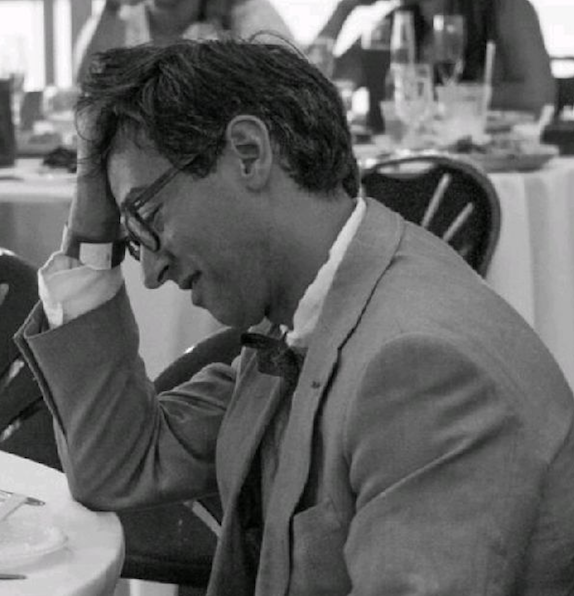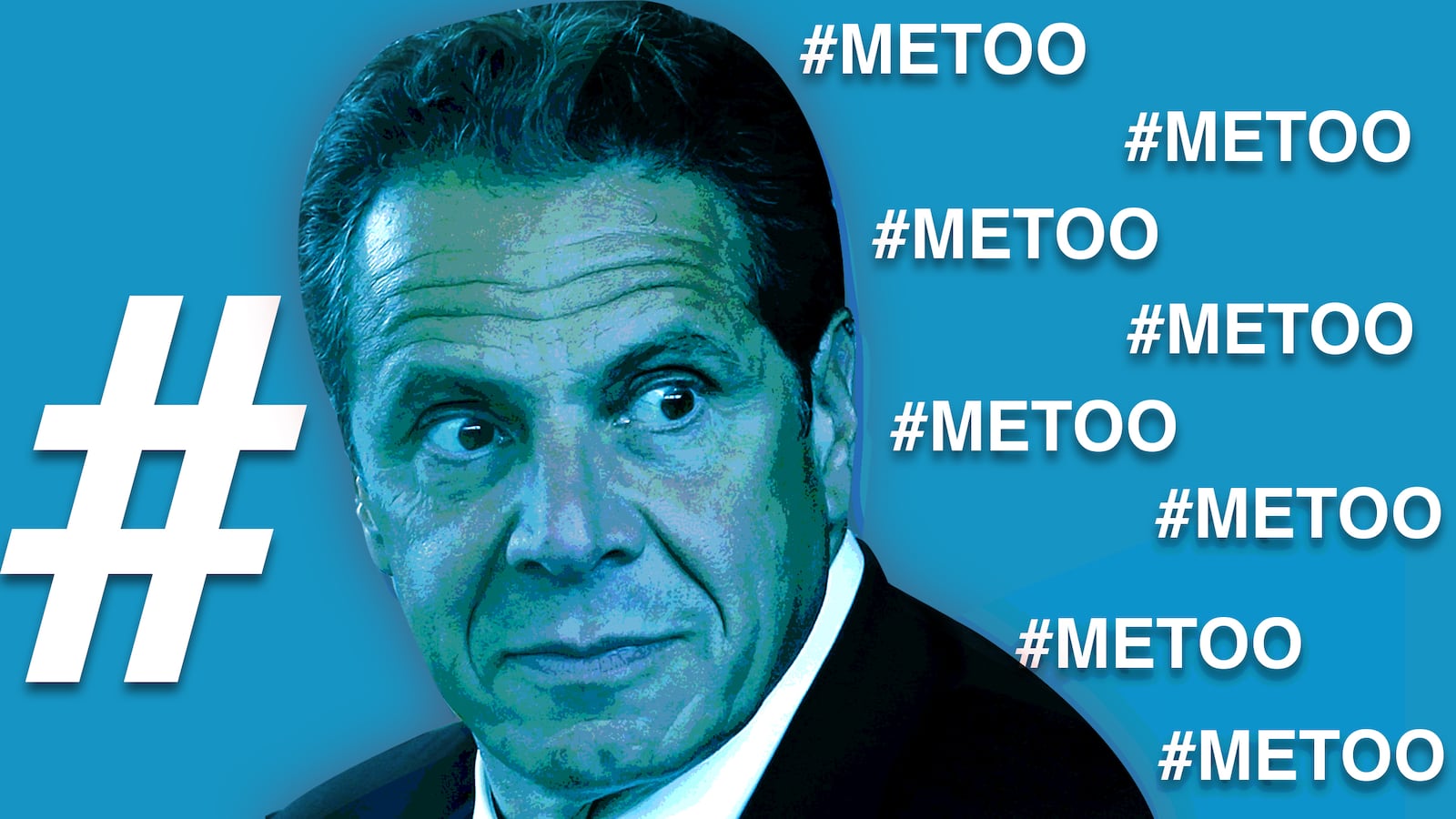At a moment when powerful men’s treatment of women is the subject of overdue scrutiny, New York Gov. Andrew Cuomo, usually known for manically managing his message, stepped in it earlier this month when he lashed out at a female reporter.
Public radio reported Karen DeWitt had asked Cuomo how he would handle workplace misconduct in his administration, citing the resignation of an economic development aide who’d engaging in an inappropriate relationship with an employee, and then paid her $50,000 to keep quiet about it.
Cuomo, who is running for re-election next year with an eye toward a 2020 presidential run, snapped that she “missed the point,” mansplaining: “When you say it’s state government, you do a disservice to women, with all due respect, even though you’re a woman. It’s not government; it’s society.”
As that footage spread, Cuomo apologized to DeWitt hours later and then held a follow-up conference call to continue explaining what he had meant to say, as top aides pledged Cuomo would address sexual harassment issues in his January State of the State speech.
“That wasn’t a sexist thing, that was a knucklehead thing,” one friend said of his spat with DeWitt. “That was driven more out of knuckle-headedness and frustration.”
Whatever drove him, it put a spotlight on Cuomo’s interactions with women just as Democrats are trying to clean house and show that—unlike the GOP—they won’t tolerate sexist behavior or worse from their political leaders.
Cuomo, usually an astute forecaster of New York’s political climate, has seemed less so during the recent #MeToo movement, even as other political heavyweights here have stepped up.
Sen. Kirsten Gillibrand led a charge to purge the military and the federal government including of power-hungry cretins and mopey gropers, including those in the Democratic party. Attorney General Eric Schneiderman opened an investigation into harassment and gender discrimination claims against Harvey Weinstein and the Weinstein Company.
Cuomo on the other hand staunchly defended holding onto Weinstein’s $118,000 in campaign contributions a week after the Times exposed Weinstein as a serial predator, and as other prominent Democrats raced to give away his contributions. He pledged to give $50,000 to a woman’s group but argued that parting with all of the money “misses the point.”
“I think it’s a symbol, but I think you also have to keep focus on the issue as opposed to the symbol: The issue is protection of women and the respect for women taking action to stop discrimination and assault,” Cuomo told reporters on Oct. 12. After a torrent of criticism, he reversed himself and pledged to donate all of Weinstein’s money.
He has looked shockingly out of touch over his administration’s handling of a sexual harassment scandal that led to the resignation of economic development aide Sam Hoyt last month.
Lisa Marie Cater, an upstate woman who obtained a job at the state DMV with Hoyt’s help, accused the bureaucrat of groping and kissing her and sending “harassing calls, texts and emails” for nearly a year in a federal court lawsuit filed on Nov. 18.
Cater says in her complaint that she had contacted the governor’s office six times about Hoyt but received “deliberate indifference,” and that a Cuomo lawyer at one point asked her whether she wanted any money.
Cuomo’s counsel Alphonso David described Cater’s claims as “demonstrably false” and said that the state launched three separate investigations into Hoyt’s conduct (the Joint Commission on Public Ethics, Inspector General, and State Employee Relations Office). He expects the case to be dismissed.
“All state employees deserve to be treated with respect,” said David. “We address every allegation of sexual harassment seriously and will continue to take all steps to detect and root out this unacceptable behavior.”
Hoyt’s predilections weren’t unknown to the governor. He was not allowed to have any interns as a legislator after the Assembly Ethics Committee discovered in 2008 that he’d had a years-long affair with an 23-year-old intern. Cuomo hired him anyway in 2011.
And just last week, Cuomo had to cancel having celebrity chef Mario Batali headline his $10,000-per-plate fundraising dinner after a Eater report revealed Batali engaged in sexual misconduct in his restaurants for two decades. Another Cuomo ally, Russell Simmons, stepped down from his companies after three women accused Simmons of sexually assaulting them.
While Cuomo was criticized for founding a Women’s Equality Party in 2014, when he was last running for reelection, that put him at the top of its ticket, he also twisted conservative lawmakers’ arms to pass same sex marriage in 2011, signed legislation to curb gender discrimination in 2015, and expanded access to contraception earlier this year.
Upon entering office, the governor established a uniform sexual harassment policy for state workers and required them to attend annual workplace trainings. There have been no public allegations of sexual harassment in Cuomo’s office, and former colleagues say that was never as issue there. But while he’s recently hired and promoted women into top positions,his small circle of trusted advisers remains almost entirely male.
His longtime aide, former executive deputy secretary Joe Percoco, is facing a federal bribery trial early next year, where prosecutors will unveil a trove of records relating to the charges—which one insider notes may include communications between the governor and a friend he has characterized as his adopted “brother.”
“How did they talk about women on texts, emails, when they didn’t think anyone is listening?” said the insider. “It’s probably the most innocuous coming down pike but there may be some nasty language of the governor in unguarded moments.”
Perhaps those conversations won’t be that surprising.
Albany had its own #MeToo crisis four years ago when Brooklyn Assemblyman Vito Lopez resigned after several female staff members accused him of routinely harassing them. Cuomo, who'd called on Lopez to do that and launched a sexual harassment hotline run by a state ethics commission, had an opportunity to take a strong public stand against sexual misconduct in state government.
Instead he explained in a May 2013 radio interview that people have “different avenues and options” for reporting complaints.
“They can go to the legislative ethics committee, or whatever you call it, or the legislative leadership,” Cuomo said. “They can talk to a private attorney. They can go to a district attorney. They can call a police officer, right? 911 is an option so all those options are available to a person.”
Another, less-publicized interaction with another female reporter last summer shows another side of the controlling pol—and could also end up in the oppo file of rival Democrats considering a 2020 presidential run.
At the New York State Fair, a tieless Cuomo held up a piece of bread, stared unblinking into the camera, and pleaded, “Will you eat the whole sandwich?” during a live interview with a Syracuse TV reporter.
“I will eat the whole sandwich,” News Channel 9 WSYR’s Beth Cefalu replied, gamely playing along off camera.
Gianelli’s sausage sandwich has held a place in state political lore since 2000, when Hillary Clinton gorged on one during her Senate campaign swing through Central New York while her opponent, Rick Lazio, declined.
Fully aware of the ritual, Cuomo immediately sent an aide to deliver the peppers and onion-topped worst from Gianelli’s Sausage stand to Cefalu. “Oh no, oh no I want to see you eat the whole sausage,” he bellowed.
“I don’t know if I should eat the whole sausage in front of you but I’m definitely going to eat it,” Cefalu responded as the camera pulled away.
The film clip of the interview then cut to Cefalu sitting down at Cuomo’s table next to him and Onondaga County executive Joanne Mahoney.
“No excuses,” says Cuomo, introducing her to Mahoney.
“Now there’s a lot of pressure on me to eat this sandwich!” Cefalu replied, before asking the governor for a selfie for her troubles.
“There’s too much sausage in that picture,” Cuomo quipped with a smile.






